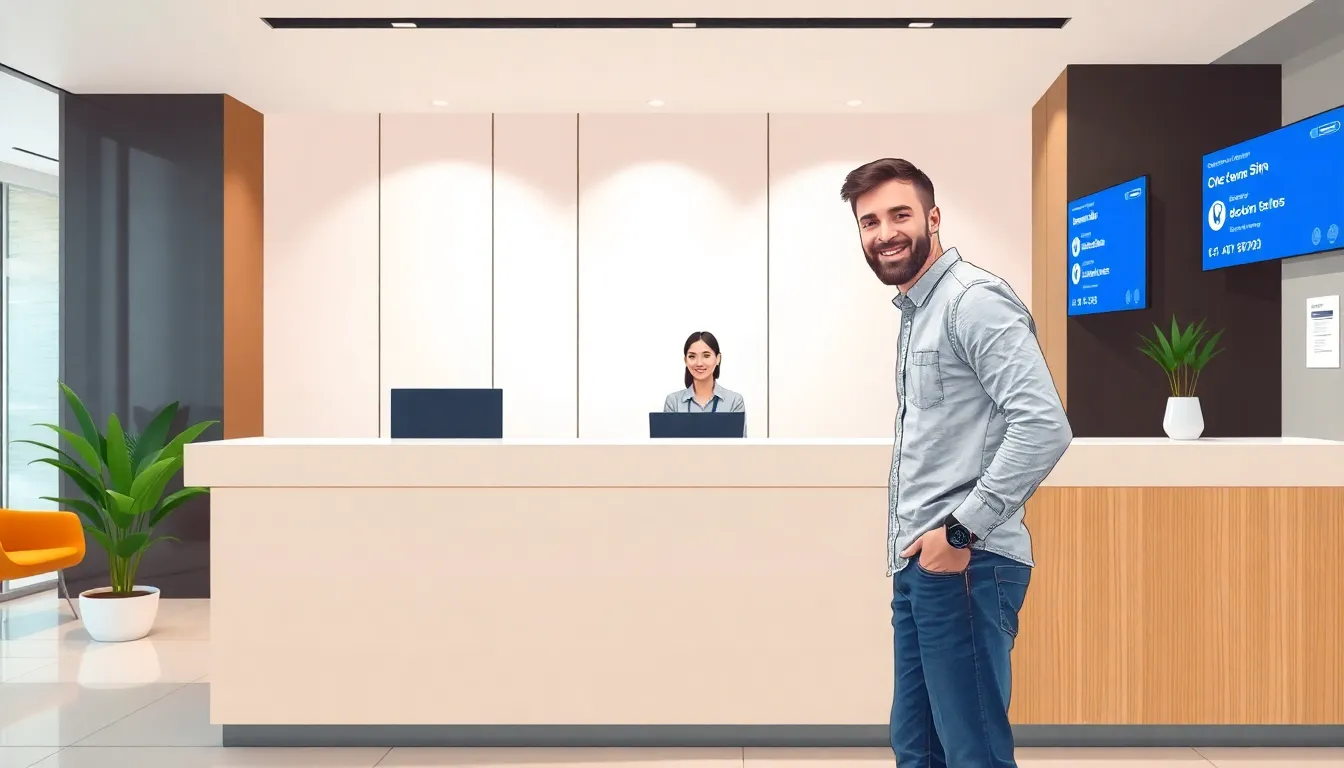Table of Contents
ToggleIn the fast-paced world of hospitality, keeping guests happy is the name of the game. But behind every satisfied customer lies a secret weapon: innovative software. Hospitality software development isn’t just about coding; it’s about crafting experiences that make guests feel like royalty while helping businesses run smoother than a well-oiled machine.
Overview of Hospitality Software Development
Hospitality software development plays a critical role in enhancing operational efficiency. Developers create solutions tailored to specific needs of hotels, restaurants, and resorts. This software enables seamless booking management, improves customer relationship management, and automates various administrative tasks.
Integrating advanced technology into hospitality operations leads to improved guest experiences. For example, mobile check-in systems reduce wait times and streamline arrivals. Additionally, property management systems help staff track reservations, manage room availability, and optimize pricing strategies.
Custom solutions drive innovation within the hospitality sector. Many businesses utilize cloud-based applications to ensure data security and provide remote access for staff. Furthermore, AI and data analytics enhance personalized marketing efforts by analyzing customer preferences and behaviors.
Developers focus on user-friendly interfaces to simplify technical processes. Training staff on effective software use becomes essential for maximizing benefits. Regular updates and maintenance guarantee that hospitality software stays current with industry trends and compliance needs.
Adopting this technology leads to measurable improvements in customer satisfaction and business performance. Businesses can significantly reduce operating costs by automating repetitive tasks. Ultimately, hospitality software development creates a solid foundation for businesses to thrive in a competitive market.
Key Features of Hospitality Software

Effective hospitality software includes essential features that enhance operational efficiency and guest satisfaction. These functionalities streamline various processes crucial for the hospitality industry.
Property Management Systems
Property management systems (PMS) centralize operations for hotels and resorts. They manage room availability, rates, and bookings in real-time. Staff can handle check-ins, check-outs, and housekeeping tasks efficiently. Advanced PMS offer integration with other systems, enabling seamless data transfer. This integration fosters communication among different departments, improving the overall guest experience. Additionally, analytics within PMS provide valuable insights into occupancy rates and guest preferences.
Booking and Reservation Management
Booking and reservation management features streamline the entire booking process. They allow guests to make reservations online with ease. Automation reduces the potential for errors in double bookings and overbooked dates. Access to real-time availability enhances customer satisfaction. Notifications remind guests of upcoming reservations, reducing no-show rates. This software often integrates with third-party platforms, expanding reach and improving revenue generation. Customization options enable businesses to tailor pricing and packages to suit market demand.
Customer Relationship Management
Customer relationship management (CRM) systems are vital for maintaining guest relationships. This software gathers data on guest preferences and behaviors, allowing for personalized services. Identifying loyal customers helps in crafting targeted marketing campaigns. CRM tools facilitate communication through emails and surveys, gathering feedback for continuous improvement. Tracking customer interactions leads to enhanced service delivery and satisfaction. Ultimately, utilizing CRM effectively contributes to building a strong clientele base and fostering customer loyalty.
Benefits of Hospitality Software Development
Hospitality software development provides significant advantages across various areas. Enhanced guest experiences, operational efficiency, and data-driven decision-making represent the primary benefits.
Enhanced Guest Experience
Improved guest experience results from tailored functionalities that address specific needs. Personalized communications create stronger connections with guests, while streamlined booking systems reduce wait times. Reservation platforms offer instant confirmations, increasing guest satisfaction. Mobile check-in options further enhance convenience, allowing guests to bypass traditional check-in desks. Customized services, based on guest preferences and previous stays, foster loyalty and encourage repeat visits.
Operational Efficiency
Operational efficiency significantly increases with effective software solutions. Property management systems centralize various operations, including room availability and bookings, ensuring staff stay informed. Real-time updates mitigate errors and enhance communication between departments, enabling quick service delivery. Automation of administrative tasks lessens the workload on staff, allowing them more time to focus on guest relations. These efficiencies directly contribute to lower operational costs while maximizing resource utilization.
Data-Driven Decision Making
Data-driven decision-making empowers businesses to leverage insights from customer interactions and preferences. Hospitality software aggregates valuable data that helps identify trends and patterns within guest behavior. Access to advanced analytics tools enables operators to optimize marketing strategies and tailor services. Making informed decisions based on empirical data elevates the quality of service and increases profitability. Continuous assessment of relevant metrics supports ongoing improvements in customer satisfaction and overall business performance.
Challenges in Hospitality Software Development
Developing effective hospitality software presents several challenges that can impact overall success. These obstacles often arise from the need for seamless integration and the ability to customize solutions to meet specific business demands.
Integration with Existing Systems
Integrating new hospitality software with existing systems often proves complex. Compatibility issues can arise, leading to disruptions in operations. Systems such as property management, booking engines, and payment gateways require smooth communication for efficient workflows. Without proper integration, data silos can form, which hinders access to valuable information. Successful integration demands thorough planning and a comprehensive understanding of current systems.
Customization and Scalability
Customization of hospitality software often poses a significant challenge. Each business has unique needs that generic software cannot always address effectively. Implementing tailored features requires time and resources. Scalability also becomes crucial as businesses grow or modify services. Staying adaptable to changing market demands without overhauling entire systems is essential for long-term success. Businesses must ensure that their software can scale without compromising performance or user experience as they expand.
Future Trends in Hospitality Software Development
Emerging trends reshape hospitality software development. Innovations like artificial intelligence (AI) and mobile applications lead the way.
Artificial Intelligence in Hospitality
AI transforms operations throughout the hospitality sector. Predictive analytics interpret guest behavior, enabling tailored experiences. AI-powered chatbots facilitate real-time customer service, improving response times and service quality. Machine learning algorithms enhance dynamic pricing strategies, allowing businesses to adapt to market conditions instantaneously. Additionally, data management systems utilize AI to streamline workflows and reduce operational costs. Hotels can harness these technologies to provide superior guest interactions and ensure higher satisfaction rates.
Mobile Applications and Guest Engagement
Mobile applications serve as essential tools for guest engagement. With increased smartphone usage, guests expect quick access to services. Personalized mobile apps allow users to manage reservations, check in, and communicate with staff effortlessly. Features like push notifications keep guests informed about promotions and events. Engagement metrics prove that mobile interaction leads to a boost in customer loyalty and satisfaction. Investing in well-designed mobile applications ensures businesses stay competitive and meet evolving consumer expectations.
Investing in hospitality software development is essential for businesses aiming to enhance guest experiences and streamline operations. By embracing advanced technologies and tailored solutions, companies can improve efficiency and foster customer loyalty.
As the industry evolves, staying ahead of trends like AI and mobile applications will be crucial for maintaining a competitive edge. The integration of these innovations not only optimizes service delivery but also empowers businesses to make data-driven decisions.
Ultimately, effective hospitality software development leads to significant improvements in customer satisfaction and operational performance, ensuring long-term success in a dynamic market.




